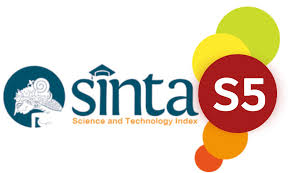The Correlation Study Between Students’ Metacognitive Strategy and Self-Efficacy in Learning English
DOI:
https://doi.org/10.37253/iallteach.v5i1.7320Keywords:
metacognitive, self-efficacy, speaking skillsAbstract
The objective of this research was to find out the correlation between students’ metacognitive strategy and their self-efficacy in speaking skills at the third grade of language major of MAN Tanjungpinang. The subject of this research was all of the students of the third grade of language major of MAN Tanjungpinang. The object of the research is students in the third grade of language major of MAN Tanjungpinang. The population of this research was 197 students of the third grade in MAN Tanjungpinang with 19 of the students being used as samples of the research. To collect the data, the researcher used observation and questionnaires. To analyze the data the researcher used descriptive statistics with a Pearson Product Moment and tested of the significance of the correlation coefficient. The result indicated that the value of the correlation coefficient (r) is 0.425, with level of correlation is moderate because it is in the coefficient interval between 0.40 - 0.599, while the value of tcomputed is greater than the value ttable (1,935>1,734) and the significance value is 0,035, which is 0,035<0,05 (1-tailed). H0 is rejected and Ha is accepted. It means that there is a significant correlation between students’ metacognitive strategy and their self-efficacy in speaking at the third grade of language major of MAN Tanjungpinang at 0,05 level (1-tailed).
Downloads
References
Asakereh, A., & Dehghannezhad, M. (2015). Student satisfaction with EFL speaking classes: Relating speaking self-efficacy and skills achievement. Issues in Educational Research, 25(4), 362–363.
Baron Levi, J. (2020). The Hairy Bikie and Other Metacognitive Strategies. Switzerland: Springer Nature. https://doi.org/10.1007/978-3-030-46618-3
Brown, H. D. (2004). Language Assessment: Principles and Classroom Practice. Pearson Longman.
Brown, H. D. (2007). Principles of Language Learning and Teaching (5th ed.). Pearson Longman.
Cambridge Dictionary. (n.d.). Retrieved July 27, 2021, from https://dictionary.cambridge.org/dictionary/english/
Donna Wilson, & Marcus Conyers. (2016). Teaching Students To Drive Their Brains: Metacognitive Strategies, Activities, And Lesson Ideas. Alexandria: Ascd.
et al., A. (2020). The effect of metacognitive strategies implementation on students’ reading comprehension achievement. International Journal of Instruction, 13(2), 848. https://doi.org/10.29333/iji.2020.13257a
et al., K. (2015). A Study on the Speaking Ability of the Second Year Students of SMK Telkom Pekanbaru. Jurnal Online Mahasiswa Fakultas Keguruan Dan Ilmu Pendidikan Universitas Riau (JOM FKIP UNRI), 5.
et al., M. W. (2019). The interplay between pronunciation self-efficacy sources and self-efficacy beliefs: A structural equation modeling approach. Indonesian Journal of Applied Linguistics, 9(1), 177–187. https://doi.org/10.17509/ijal.v9i1.15933
et al., Mania. (2014). EFL learners’ self-efficacy, metacognitive awareness, and use of language learning strategies: How are they associated? Theory and Practice in Language Studies, 4(5), 1082. https://doi.org/10.4304/tpls.4.5.1080-1092
et al., Marianne. (2014). Teaching English as a second or foreign language. Sherrise Roehr.
et al., R. (2020). Metacognitive Strategies and Learning Quality: a Systematic Mapping Study, (2013), 48. https://doi.org/10.33965/icedutech2020_202002l007
et al., S. (2012). Self-efficacy in Second/foreign language learning contexts. English Language Teaching, 5(11), 60–73. https://doi.org/10.5539/elt.v5n11p60
Haciomeroglu, G. (2019). The relationship between elementary students’ achievement emotions and sources of mathematics self-efficacy. International Journal of Research in Education and Science, 5(2), 548–559.
Khezrlou, S. (2012). The Relationship between Cognitive and Metacognitive Strategies, Age, and Level of Education. The Reading Matrix, 12(1), 50–61.
Kirbulut, Z. D. (2014). Modeling the relationship between high school students’ chemistry self-efficacy and metacognitive awareness. International Journal of Environmental and Science Education, 9(2), 177–196. https://doi.org/10.12973/ijese.2014.210a
Leong Lai-Mei and Seyedeh Masoumeh Ahmadi. (2016). An Analysis of Factors Influencing Learners’ English Speaking Skill. International Journal of Research in English Education, (March, 2017), 35. Retrieved from www.ijreeonline.com
Loaiza, J. G. (2014). The Self-Directedness, Metacognitive Awareness, Self-Efficacy, and Grammatical Competence of College Students Studying Spanish. University of Southern Mississippi. Retrieved from https://aquila.usm.edu/dissertations
Loo, C. W., & Choy, J. L. F. (2013). Sources of Self-Efficacy Influencing Academic Performance of Engineering Students. American Journal of Educational Research, 1(3), 86–92. https://doi.org/10.12691/education-1-3-4
Mytkowicz, P., & Steinberg, B. (2009). Metacognition as a Learning Outcome in a Postsecondary Strategic Learning Course Disability. Journal of Postsecondary Education and Assessing, 27(1), 51–62.
Oğuz, A., & Kutlu Kalender, D. (2018). Relationship between Metacognitive Awareness and Self-Efficacy of Secondary School Students. Journal of Theory and Practice in Education, 14(October 2016), 170–186. https://doi.org/10.17244/eku.319267
Phan, N. T., & Locke, T. (2015). Sources of self-efficacy of Vietnamese EFL teachers: A qualitative study. Teaching and Teacher Education, 52, 73–82. https://doi.org/10.1016/j.tate.2015.09.006
Raoofi, S., Chan, S. H., Mukundan, J., & Md Rashid, S. (2013). Metacognition and second/foreign language learning. English Language Teaching, 7(1), 36–49. https://doi.org/10.5539/elt.v7n1p36
Risa, A. (2018). The Relationship of Students’ Speaking Self-Efficacy, Collocational Competence, and Their Speaking Performances (A Correlational Study at Seven Senior High Schools in Sukabumi Regency). Universitas Islam Negeri Syarif Hidayatullah Jakarta.
Schraw, G., & Dennison, R. S. (1994). Assessing metacognitive awareness. Contemporary Educational Psychology. https://doi.org/10.1006/ceps.1994.1033
Shi, H. (2018). English language learners’ strategy use and self-efficacy beliefs in English language learning. Journal of International Students, 8(2), 724–741. https://doi.org/10.5281/zenodo.1250375
Sugiyono. (2015). Metode Penelitian Kuantitatif, Kualitatif, dan R&D. Bandung: Alfabeta.
Sugiyono. (2020). Metode Penelitian Kuantitatif, Kualitatif, dan R&D. Bandung: Alfabeta.
Wijaya, H. R. (2015). Improving the Speaking Learning Process of Seventh Grade Students of SMP N 1 Kebonagung Pacitan in the Academic Year of 2014/2015 Through Animation Movies, 13–15.




.png)






